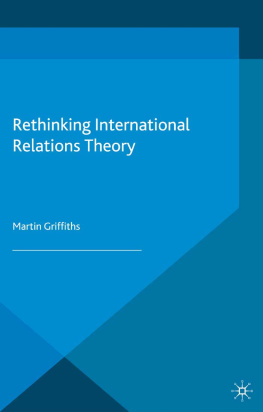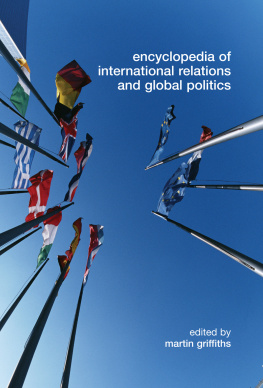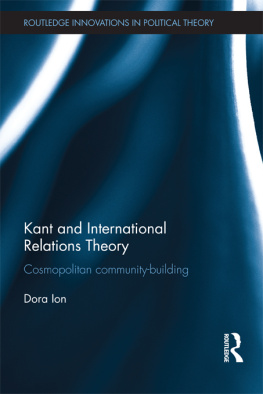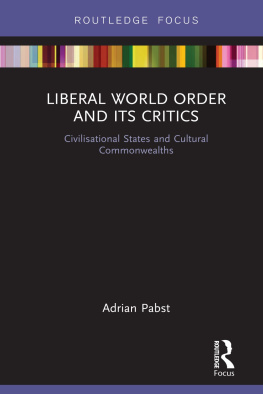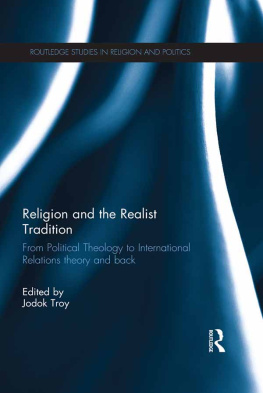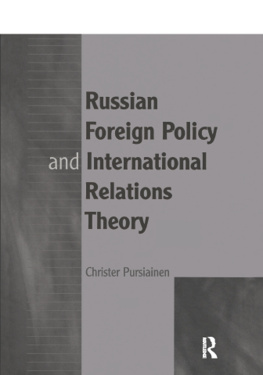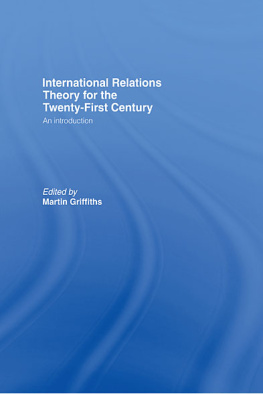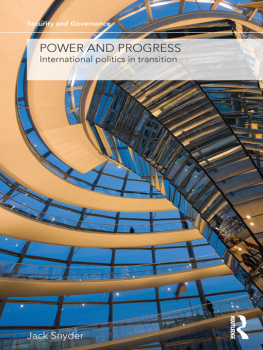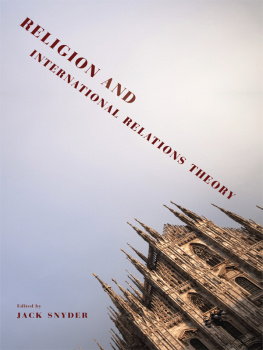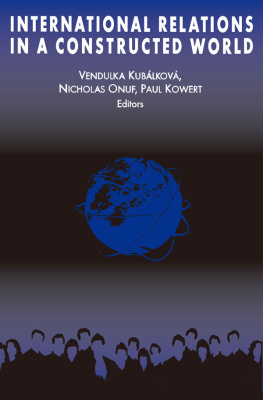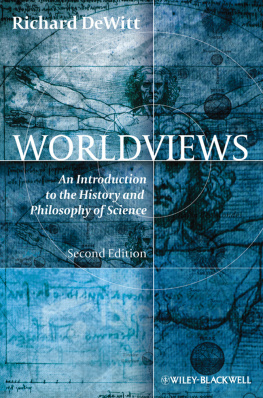Rethinking World Politics
Series Editor: Professor Michael Cox
In an age of increased academic specialization where more and more books about smaller and smaller topics are becoming the norm, this major new series is designed to provide a forum and stimulus for leading scholars to address big issues in world politics in an accessible but original manner. A key aim is to transcend the intellectual and disciplinary boundaries which have so often served to limit rather than enhance our understanding of the modern world. In the best tradition of engaged scholarship, it aims to provide clear new perspectives to help make sense of a world in flux. Each book addresses a major issue or event that has had a formative influence on the twentieth-century or the twenty-first-century world which is now emerging. Each makes its own distinctive contribution as well as providing an original but accessible guide to competing lines of interpretation. Taken as a whole, the series will rethink contemporary international politics in ways that are lively, informed and above all provocative.
Published
Nick Bisley
Rethinking Globalization
Martin Griffiths
Rethinking International Relations Theory
Adrian Guelke
Rethinking the Rise and Fall of Apartheid
Richard Stubbs
Rethinking Asias Economic Miracle
Forthcoming
Mark T. Berger and Heloise Weber
Rethinking the Third World
John Dumbrell
Rethinking the Vietnam War
David H. Dunn
Rethinking Transatlanticism
Peter Shearman
Rethinking Soviet Communism
In preparation
Rethinking European Integration
Rethinking Global Governance
Rethinking the Twentieth Century
Rethinking the Cold War
Rethinking the Emergence of a Global Economy
Rethinking the Post-Cold War World Order
Rethinking the Rise of Islam
Rethinking the First World War
Rethinking the Second World War
Rethinking the Twenty Years Crisis: 191939
Rethinking US Hegemony
Also by Martin Griffiths
Fifty Key Thinkers in International Relations, Second Edition (London: Routledge, 2009) [with Steven Roach and M. Scott Solomon].
International Relations: The Key Concepts, Second Edition (London: Routledge, 2008) [with Terry OCallaghan and Steven Roach].
Editor, International Relations Theory for the 21st Century (London: Routledge, 2007).
Co-Editor, Anti-Americanism in the 21st Century (Oxford: Greenwood Press, 2007) [with Brendon OConnor].
Co-Editor, The Rise of Anti-Americanism (London: Routledge, 2006) [with Brendon OConnor].
Editor, The Routledge Encyclopedia of International Relations and Global Politics (London: Routledge, 2005).
Realism, Idealism and International Politics: A Reinterpretation (London: Routledge, 1995).
Rethinking International Relations Theory
Martin Griffiths
Martin Griffiths 2011 Foreword Michael Cox 2011
All rights reserved. No reproduction, copy or transmission of this publication may be made without written permission.
No portion of this publication may be reproduced, copied or transmitted save with written permission or in accordance with the provisions of the Copyright, Designs and Patents Act 1988, or under the terms of any licence permitting limited copying issued by the Copyright Licensing Agency, Saffron House, 6 10 Kirby Street, London EC1N 8TS.
Any person who does any unauthorized act in relation to this publication may be liable to criminal prosecution and civil claims for damages.
The author has asserted his right to be identified as the author of this work in accordance with the Copyright, Designs and Patents Act 1988.
First published 2011 by
PALGRAVE MACMILLAN
Palgrave Macmillan in the UK is an imprint of Macmillan Publishers Limited, registered in England, company number 785998, of Houndmills, Basingstoke, Hampshire RG21 6XS.
Palgrave Macmillan in the US is a division of St Martins Press LLC, 175 Fifth Avenue, New York, NY 10010.
Palgrave Macmillan is the global academic imprint of the above companies and has companies and representatives throughout the world.
Palgrave and Macmillan are registered trademarks in the United States, the United Kingdom, Europe and other countries
ISBN 9780230217782 hardback
ISBN 9780230217799 paperback
This book is printed on paper suitable for recycling and made from fully managed and sustained forest sources. Logging, pulping and manufacturing processes are expected to conform to the environmental regulations of the country of origin.
A catalogue record for this book is available from the British Library. A catalog record for this book is available from the Library of Congress.
10987654321
20191817161514131211
Printed in China
Contents
Preface
The title of this book may appear to be an instance of overkill to those who follow debates about the past, present and future of International Relations (IR) theory. For reasons spelled out in the introductory chapter, rethinking IR theory is a constant activity in the field. As one colleague remarked when I told him of the title of the book, the problem with our field is that theres too much rethinking and not enough thinking about international relations. He may be right, but as I try to show, one cant avoid IR theory in the study of international relations, which means, in turn, that one cannot avoid taking up some position in the complex debate over the merits of competing worldviews in IR theory.
In this book I make the case for IR theory as the site of an enduring great debate generated by the tensions within one particular worldview that also dominates IR theory and, to a lesser extent, practice. Liberal internationalism, I claim, is a purposive political project backed up by a powerful body of empirical theory and endorsed by the United States, still the most powerful country in the world. There are, however, deep tensions within and between its alleged engines of historical progress: democratization, interdependence and international organization. I explore these tensions in some detail (Chapters 35), before turning first to the main critics of liberal internationalism (realists and cosmopolitan critical theorists) and then to those who seek to build bridges between them.
The book is an attempt to do two things: to provide a succinct overview of the main schools of thought in the field of IR theory, and to make a substantive argument about those schools of thought and how they relate to one another. This has been a difficult exercise, but ultimately a rewarding one. My first thanks go to my students at Griffith University, who have served as the guinea pigs for the argument as it has evolved over the past two years. Thanks to Leong Liew, Head of the Department of International Business and Asian Studies, and to Griffith University for granting me six months leave to write the book, and to my colleagues Ian Hall, Michael Heazle, Tom Conley and George Crowder for their advice along the way. The book could not have been completed without the encouragement and criticism of Mick Cox, Steven Kennedy and two reviewers advice on the initial draft typescript. Sometimes it is hard to tell the difference between the trees and the forest, and it helps to be reminded that there is one. I would also like to acknowledge the assistance of Robyn White for her help in preparing the manuscript. Finally, this book is dedicated to my dear Kylie, our daughter Jade and our most recent addition to the family, Samuel. I made a vow to finish the book before he was born. I lost the bet, but his imminent arrival in the world spurred me to the finish line, for which he has my eternal gratitude.

